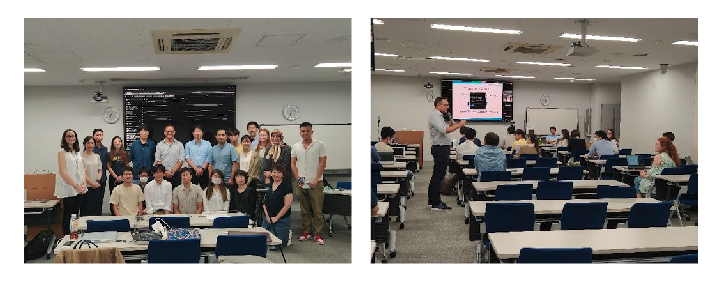Report: Kyoto University School of Public Health International Lecture: Introduction and Invitation for Digital Public Health
On the afternoon of June 29, 2023, an international lecture on “Digital Public Health” was held at the School of Public Health, Graduate School of Medicine, Kyoto University (KUSPH). About 30 students and faculty members from KUSPH participated in this international lecture, which was held in a hybrid format, on-site and via ZOOM. Prof. Rodolphe Thiébaut of the University of Bordeaux was invited as a guest speaker. The purpose of this international lecture was to present the graduate education and research activities related to digital public health conducted at the University of Bordeaux.
First, Prof. Thiébaut gave an overview of the University of Bordeaux and its fields of study. The University of Bordeaux, located about 2 hours by train from the capital city of Paris, is the largest public health school in France with more than 500 researchers. There are 15 research fields, and a brief introduction of each was given. Next, Prof. Thiébaut’s laboratory, SISTM (Statistics in Systems Biology and Translational Medicine), was introduced. We heard about some of their representative studies: how Ebola vaccine works, how long the effect lasts, how to predict the response in a given individual, and what is the optimal schedule of the injections.
Next, he talked about two research papers recently published by researchers at the University of Bordeaux on COVID-19. The first paper, entitled “Estimating the population effectiveness of inventions against COVID-19 in France,” used open data to analyze the effectiveness of Non-Pharmaceutical Interventions(NPIs) in reducing SARS-CoV-2 virus transmission in France. The results show that NPIs implemented by the French government significantly reduced SARS-CoV-2 transmission. This paper was written by a student in the Cotutelle program, which will be introduced later. The second paper, entitled “Forecasting SARS-CoV-2 hospitalizations using EHR: from linear regression to reservoir computing,” uses large-scale data from the Electronic Health Record (EHR) to predict the number of hospitalizations due to SARS-CoV-2. The results showed that the curfew was effective in controlling the number of hospitalizations, but the impact of weather was small, at 20%. He also explained that reservoir computing is the next step that is expected in the future.
In the second half of the presentation, he explained about the Digital Public Health Program at the University of Bordeaux. It has four characteristics. The first is that the program consists of three main areas: epidemiology, statistics, and computer sciences; the second is that the program is data-centered; the third is that all classes are conducted in English for international training and research; and the fourth is that the program focuses on internships and has a joint program with McGill University in Canada. Regarding the fourth point, he explained about the master’s program and the doctoral program. First, the master’s program at the University of Bordeaux is basically a one-year program. In the joint program, one year of study at McGill University is followed by one year at the University of Bordeaux, for a total of two years, to obtain two master’s degrees from both universities as a double degree. The doctoral program, the Cotutelle Double Degree Program, allows students to study at the University of Bordeaux and McGill University in Canada, respectively. The attraction of this program is that it places students in the best environment to learn what they need for the individuals. Finally, he gave a message that he expects the University of Bordeaux and Kyoto University to deepen their collaboration as well, since having students belong to more than one laboratory makes it possible for joint research to progress and produce better products.
After the lecture, students asked various questions about the significance of the research and the contents of classes at the University of Bordeaux. At the end of the lecture, Professor Iwami, Professor of Preventive Medicine in KUSPH, commented that in order to deepen cooperation and realize exchanges with the University of Bordeaux in the future, it is important for students who wish to study at the University of Bordeaux to express their opinions.
